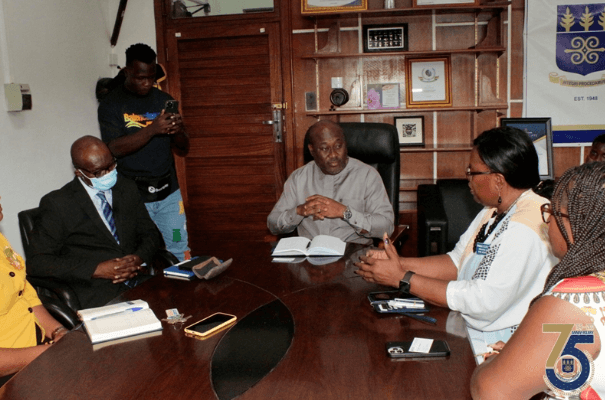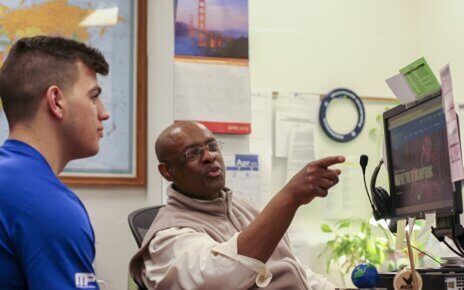A Monmouth University delegation met with officials from the University of Ghana to discuss areas of shared interest and collaboration; more specifically, to renew a previous partnership through the Department of Social Work.
The delegation was led by Pamela Scott-Johnson, Ph.D., Provost and Senior Vice President for Academic Affairs, who met with Gordon A. Awandare, Pro-Vice-Chancellor of Academic and Student Affairs at the University of Ghana.
“It was really a great opportunity to have a discussion face-to-face, especially since I happened to be in Ghana already,” said Scott-Johnson. She was on a business trip in Ghana, and it is her practice to connect with other administrators when traveling.
The University has a longstanding affiliation with the University of Ghana in Accra, dating back to 2003 through the Department of Social Work and Sociology.
“We had a memorandum of understanding that allowed for Master of Social Work students in our Global and Community Practice specialization to travel to Ghana in the spring semester of their second year to complete their field internship in Ghana. Our students would leave in early January and be back by early April,” described Robin Mama, Ph.D., MSS, LSW, Dean of the School of Social Work at Monmouth University.
“It’s one thing to read about places and different cultures. It’s a whole different thing to actually go somewhere and experience what it is to be in a foreign country, in a place that’s completely differently from where you grew up and where you’re living. To really experience that is a remarkable learning experience,” explained Janine Speiser, MSW, LSW, Assistant Director of Professional Education and Special Projects for the School of Social Work. Speiser earned her Master’s in Social Work and was one of the last students to travel to Ghana for her internship completion.
Sanjana Ragudaran, Ph.D., MSW, emphasized the importance of global interactions in the social work space. She started, “International collaborations are important in social work. We are functioning in a global space where social problems are interconnected.”
“Student experiences overseas are invaluable in understanding the problems and how they are addressed in different countries,” continued Ragudaran.
According to a recap of the meeting provided by the University of Ghana, the institutions discussed renewing collaboration between social work departments, as well as cultivating new partnerships in other areas.
Daniel Frimpong Ofori, Provost of the College of Humanities at the University of Ghana, was also present at the meeting in which he provided an overview of some of the academic projects the College of Humanities is presently pursuing, welcoming the proposition of additional partnerships with Monmouth University.
“It would be really nice to renew our partnership with the University of Ghana. In addition to sending students, we also invited their faculty members to Monmouth and vice versa,” said Golam Mathbor, MSS, MSW, Ph.D., RSW, Professor of Social Work.
“Our affiliation saw us also host Dr. Stephen Ayidia, who was the chair of the department at Monmouth for a visit and lecture,” added Mama, who served as an outside evaluator for Ph.D. dissertations from their department, noting that Monmouth sent social work books to the department twice.
“Students benefit from international engagement,” said Scott-Johnson on the importance of retaining international partnerships. “It’s a great opportunity for us to broaden our perspectives on how we support international travel, student engagement, community engagement, social justice, and human rights.”
Although international partnerships in general pose opportunities for growth, establishing a connection in Ghana offers its own unique set of benefits. “The continent of Africa has been by-passed and excluded often in the development work globally and this continent is not only important for its abundant natural resources but also for the development world to learn about people’s indigenous initiatives emerging out of this continent,” explained Mathbor.
“Our students have a lot to learn and at the same time contribute through their service learning projects for the people there out of internship opportunities with the University of Ghana and its affiliated institutions,” Mathbor continued.
“International partnerships are an essential component of our work at the school. Our program is grounded in Human Rights and Social Justice. This opportunity can open doors for student experiences to immerse themselves in the local culture, and practices and learn about social work practice in another country,” added Ragudaran. “I especially welcome this attempt as it is an African country and the perspective is different from that of Europe or Asia. I think that this would be an excellent opportunity for students in Global Community Practice in our MSW program.”
“In our world, the unknown can be scary. Foreign countries and foreign people are often portrayed in ways that aren’t always positive,” described Speiser, who reflected on her 10-week internship in Ghana as a largely positive experience where she felt truly integrated in the local culture.
In light of the University’s latest attempt to rekindle this relationship with the University of Ghana and reinstate similar international collaborations that allowed her to complete her internship abroad, Speiser advises students to do their research and assess opportunities for foreign travel with an open mind.
“Take all of your expectations, all of your preconceptions, all of the ideas you think you have about what this is going to be, put them in a basket, and leave them in the backpack at the airport. Leave it behind and go with an open mind,” she recommended.




